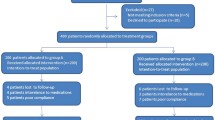Abstract
Bleeding peptic ulcer is the most importantcause of upper gastrointestinal bleeding. Our aim was tocompare the effect of anti-Helicobacter therapy withmaintenance treatment of H2-receptorantagonist in the prevention of relapses of ulcer andbleeding. Patients with bleeding duodenal or gastriculcers and H. pylori infection were randomized toreceive either a one-week course of triple therapy with bismuth subcitrate, metronidazole, andtetracycline plus ranitidine or a six-week course ofranitidine 300 mg/day. After the ulcers healed, theantibiotic-treated patients were not given anymedication, whereas the ranitidine-treated patientscontinued to receive a maintenance dose of 150 mg/day.One hundred twenty-six patients were randomized toreceive anti- Helicobacter therapy and 124 patients toreceive long-term ranitidine. H. pylori eradication wasachieved in 98.2% in those who received triple therapyand 6.1% in those who received ranitidine (P <0.0001). At the six-week follow-up, ulcer healing was documented in 88.2% in those who receivedtriple therapy and 86.1% in those who receivedranitidine (P = 0.639). Recurrent ulcer developed innine of the ranitidine-treated patients and three ofthem presented with recurrent upper gastrointestinal bleeding.One patient in the antibiotic group developed recurrentulcer without rebleeding (P = 0.01). It is concludedthat eradication of H. pylori is sufficient for the prevention of recurrent bleedingulcers.
Similar content being viewed by others
REFERENCES
Laine L, Peterson W: Current concepts in peptic ulcer bleeding. N Engl J Med 331:717–727, 1994
Jensen DM, Cheng S, Kovac TOG, et al: A controlled study of ranitidine for the prevention of recurrent hemorrhage from duodenal ulcers. N Engl J Med 330:382–386, 1994
Graham DY, Lew GM, Klein PD, et al: Effect of treatment of Helicobacter pylori infection on the long-term recurrence of gastric or duodenal ulcer: A randomized, controlled study. Ann Intern Med 116:705–708, 1992
Rauws EAJ, Tytgat GNJ: Cure of duodenal ulcer associated with eradication of Helicobacter pylori. Lancet 335:1233–1235, 1990
Hentschel E, Brandstatter G, Dragosics B, et al: Effect of ranitidine and amoxicillin plus metronidazole on the eradication of Helicobacter pylori and the recurrence of duodenal ulcer. N Engl J Med 328:308–312, 1993
Sung JJY, Chung SCS, Ling TKW, et al: Antibacterial treatment of gastric ulcers associated with Helicobacter pylori. N Engl J Med 332:139–142, 1995
NIH Consensus Conference: Helicobacter pylori in peptic ulcer disease. JAMA 272:65–69, 1994
Labenz J, Borsch G: Role of Helicobacter pylori eradication in the prevention of peptic ulcer bleeding relapse. Digestion 55:19–23, 1994
Graham DY, Hepps KS, Ramirez FC, et al: Treatment of Helicobacter pylori reduces the rate of rebleeding in peptic ulcer disease. Scand J Gastroenterol 28:939–942, 1993
Rokkas T, Karameris A, Mavrogeorgis A, et al: Eradication of Helicobacter pylori reduces the possibility of rebleeding in peptic ulcer disease. Gastrointest Endosc 41:1–4, 1995
Jaspersen D, Koerner T, Schorr W, et al: Helicobacter pylori eradication reduces the rate of rebleeding in ulcer hemorrhage. Gastrointest Endosc 41:5–7, 1995
Laine L: The long-term management of patients with bleeding ulcers: Helicobacter pylori eradication instead of maintenance antisecretory therapy. Gastrointest Endosc 41:77–79, 1995
Santander C, Gravalos RG, Cedenilla AG, et al: Maintenance treatement versus Helicobacter pylori eradication therapy in preventing rebleeding of the peptic ulcer disease. A clinical trial and follow-up for 2 years. Am J Gastroenterol 91:1549–1552, 1996
Maier M, Schilling D, Dorlars D, et al: Eradication of Helicobacter pylori or H2 blocker maintenance therapy after peptic ulcer bleeding: A prospective randomized trial. Gastroenterology 108:A156, 1995
Sung JJY, Chung SCS, et al: Dual therapy or triple therapy for the treatment of H. pylori associated duodenal ulcer. Dig Dis Sci 41:453–457, 1996
Lind T, Veldhuyzen van Zanten SJ, Unge P: The MACH-1 study: Optimal one-week treatment for H. pylori defined? Gut 37:A4, 1995
Bazzoll F, Gullini S, Zagari RM, et al: Effect of omeprazole and clarithromycin plus tinidazole on the eradication of Helicobacter pylori and the recurrence of duodenal ulcer. Gut 37:A241, 1995
Hosking SW, Ling TKW, Chung SCS, et al: Duodenal ulcer healing by eradication of H. pylori without anit-acid treatment: Randomised controlled trial. Lancet 343:508–510, 1994
Rights and permissions
About this article
Cite this article
Sung, J.J.Y., Leung, W.K., Suen, R. et al. One-Week Antibiotics versus Maintenance Acid Suppression Therapy for Helicobacter pylori-Associated Peptic Ulcer Bleeding. Dig Dis Sci 42, 2524–2528 (1997). https://doi.org/10.1023/A:1018816729449
Issue Date:
DOI: https://doi.org/10.1023/A:1018816729449




